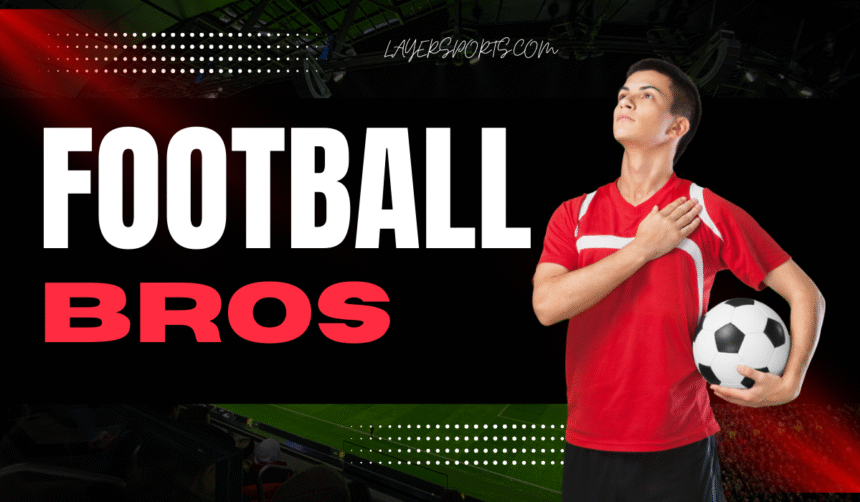Football isn’t just a sport—it’s a culture, a lifestyle, and for many, a brotherhood. Across the world, there’s a term that’s starting to resonate with fans and players alike: football bros. But what does it really mean? Is it about siblings playing side by side? Is it about the friendships forged on the field? Or is it something much bigger—a symbol of unity, rivalry, and lifelong bonds created through the beautiful game?
In this long-form exploration, we’ll break down the phenomenon of football bros, why it matters, and how it’s shaping modern football culture.
The Rise of the Term “Football Bros”
The phrase football bros has found its way into social media captions, team hashtags, and even locker room banter. At its core, it represents more than blood relations—it’s about a brotherhood born out of sweat, mud, and mutual respect.
Think of it like this: every time you see two teammates hugging after a goal, defending each other in a heated match, or sharing laughs during practice, you’re seeing football bros in action. This isn’t just about famous siblings like the Hazard brothers or the Pogba trio. It’s also about every pair or group of players who embody loyalty on and off the pitch.
But why has this idea gained so much traction in recent years? The answer lies in the changing dynamics of football culture.
Beyond Blood: Football Bros Are Everywhere

From Youth Academies to World Cups
Walk into any youth football academy and you’ll see the early seeds of football brotherhood being planted. Young players grow up together, spending countless hours perfecting their skills. Over time, these relationships evolve into something deeper.
By the time these players reach professional levels, they’ve shared victories, defeats, injuries, and triumphs. For instance, the golden generation of Spain—Iniesta, Xavi, Puyol—often spoke about their “brotherhood” built at La Masia.
At the World Cup level, teams that succeed often credit their unity. France’s 2018 squad wasn’t just talented; they were a team of football bros who trusted and respected one another.
Famous Football Bros in History
When people think of football bros, they often recall iconic sibling duos:
- Gary and Phil Neville – Manchester United legends and England internationals.
- Eden, Thorgan, and Kylian Hazard – The Belgian trio showing family dominance in football.
- Jerome and Kevin-Prince Boateng – Brothers who famously played for different national teams.
But beyond family ties, we see pseudo-brotherhoods like:
- Lionel Messi and Luis Suarez – Their friendship at Barcelona became legendary.
- Marcus Rashford and Jesse Lingard – A bromance that lit up Manchester United fans’ timelines.
This is where the beauty of football bros lies—it’s not limited by DNA.
Why Football Bros Matter in Modern Football
Football is as much a mental game as a physical one. The relationships between players have a direct impact on performance.

The Chemistry Factor
Strong bonds between players create on-field chemistry. When players understand each other instinctively, passes are sharper, movements are synchronized, and defenses are more cohesive.
Think of the connection between Xavi and Iniesta or Gerrard and Torres. Their football brotherhood allowed them to anticipate each other’s next move.
Emotional Resilience
Football bros support each other during career highs and lows. When a player faces public criticism or personal tragedy, it’s often their “bros” who step in with encouragement.
Consider Marcus Rashford’s England teammates rallying around him after the Euro 2020 penalty miss. This emotional safety net is vital in high-pressure environments.
Locker Room Culture
A healthy locker room often has strong football bro dynamics. Players who see each other as family are less likely to engage in toxic rivalries. Coaches like Jurgen Klopp cultivate this by encouraging a “one big family” mindset.
Football Bros in Pop Culture
The term football bros has transcended the pitch. It’s now a meme, a TikTok trend, and a staple of fan culture.
On Instagram, players post “#FootballBros” with photos of training sessions or vacation trips. Fans love seeing their favorite players acting like regular friends—playing video games, joking during interviews, or celebrating birthdays together.
Even video games like FIFA and EA FC embrace the concept. FUT (FIFA Ultimate Team) players often create squads featuring sibling duos or real-life best friends.
This cultural crossover shows how the idea of football bros resonates with fans longing for more human, relatable sides of their idols.
How to Build Football Bros at Grassroots Level

Start with Team Bonding
Coaches at amateur and youth levels can foster football bro relationships by organizing off-field activities. Team dinners, volunteering together, or even simple trust-building exercises strengthen bonds.
Encourage Mentorship
Senior players mentoring younger teammates create cross-generational football bros. This system ensures that brotherhood continues long after players leave the pitch.
Celebrate Togetherness
Winning and losing as a team—and celebrating both—is a key component. Small rituals, like post-match huddles or team chants, reinforce unity.
Challenges Facing Football Bros in Modern Football
While the idea of football bros is appealing, it’s not without challenges:
- Intense competition can sometimes breed envy rather than brotherhood.
- Club rivalries may fracture friendships when players switch teams.
- Social media scrutiny can turn private bonds into public gossip.
Yet, the strongest football bros manage to weather these storms, proving their relationships are more than superficial.
The Future of Football Bros
As football becomes more globalized, expect to see a rise in international football bros. Young talents moving abroad early in their careers are building friendships with players from diverse backgrounds.
There’s also a growing focus on mental health in football, making these brotherhoods even more critical. The next generation of players won’t just be teammates—they’ll be support systems for one another.
Imagine academies where players aren’t just trained as athletes but also as empathetic leaders, capable of fostering lifelong friendships. That’s the ultimate vision of football bros.
Conclusion: Football Bros Are the Heartbeat of the Game
The phrase football bros might sound casual, but it’s rooted in the deep emotional fabric of the sport. It’s about trust, loyalty, laughter, and sometimes tears. Whether it’s two kids playing barefoot on a dirt field or professionals in the Champions League final, the brotherhood remains the same.
In a world where football often gets reduced to stats and scores, the human stories of football bros remind us why we fell in love with the game in the first place.
So next time you see a pair of teammates celebrating a goal or consoling each other after a loss, remember: you’re witnessing the unspoken magic of football bros in action.







